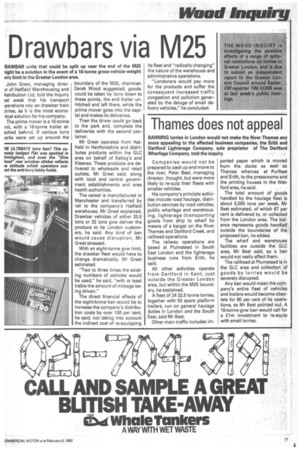Thames does not appeal
Page 11

If you've noticed an error in this article please click here to report it so we can fix it.
BANNING lorries in London would not make the River Thames any more appealing to the affected business companies, the Erith and Dartford Lighterage Company, sole proprietor of The Dartford Wharfage Company, told the inquiry.
Companies would not be prepared to pack up and move to the river, Peter Best, managing director, thought, but were more likely to re-quip their fleets with smaller vehicles.
His company's principle activities include road haulage, 'distribution services by road vehicles, public wharfage and warehousing, lighterage (transporting goods from ship to wharf by means of a barge) on the River Thames and Dartford Creek, and railhead operations.
The railway operations are based at Plumstead in South East London and the lighterage business runs from Erith, he said.
All other activities operate from Dartford in Kent, just outside the Greater London area, but within the M25 boundary, he explained.
A fleet of 24 32.5 tonne lorries, together with 50 spare platform trailers, run on general haulage duties in London and the South East, said Mr Best.
Other main traffic includes im ported paper which is moved from the docks as well as Thames wharves at Purfieet and Erith, to the pressrooms and the printing houses in the Watford area, he said.
The total amount of goods handled by the haulage fleet is about 5,000 tons per week, Mr Best estimated, of which 67 per cent is delivered to, or collected from the London area. The balance represents goods handled outside the boundaries of the proposed ban, he added.
The wharf and warehouse facilities are outside the GLC area, Mr Best said, so a ban would not really affect them.
The railhead at Plumstead is in the GLC area and collection of goods by lorries would be severely disrupted.
Any ban would mean the company's entire fleet of vehicles and trailers would become obsolete for 80 per cent of its operations, as Mr Best pointed out. A 16-tonne-gvw ban would call for a Elm investment to re-equip with small lorries.


































































